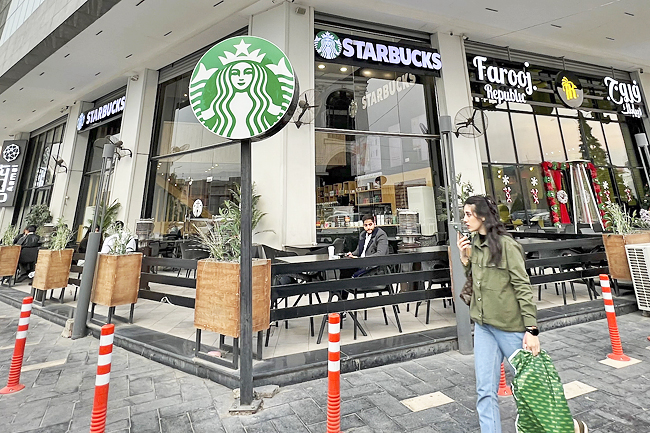BAGHDAD (AP) – Everything from the signboard outside down to the napkins bears the fficial emblem of the top international coffee chain. But in Baghdad, looks are deceiving: The “Starbucks” in the Iraqi capital is unlicenced.
Real Starbucks merchandise is imported from neighbouring countries to stock the three cafes in the city, but all are operating illegally. Starbucks filed a lawsuit in an attempt to shut down the trademark violation, but the case was halted after the owner allegedly threatened lawyers hired by the coffee house.
Be careful, he told them – and boasted of ties to militias and powerful political figures, according to United States (US) officials and Iraqi legal sources.
“I am a businessman,” owner of the fake branches Amin Makhsusi said in a rare interview in September. He denied making the threats. “I had this ambition to open Starbucks in Iraq.”
After his requests to obtain a licence from Starbucks’ official agent in the Middle East were denied, “I decided to do it anyway, and bear the consequences.” In October, he said he sold the business; the cafes continued to operate.
Starbucks is “evaluating next steps”, a spokesman wrote on Wednesday, in response to a request for comment by The Associated Press (AP). “We have an obligation to protect our intellectual property from infringement to retain our exclusive rights to it.”
The Starbucks saga is just one example of what US officials and companies believe is a growing problem. Iraq has emerged as a hub for trademark violation and piracy that cuts across sectors, from retail to broadcasting and pharmaceuticals. Regulation is weak, they say, while perpetrators of intellectual property violations can continue doing business largely because they enjoy cover by powerful groups.

Counterfeiting is compromising well-known brands, costing companies billions in lost revenue and even putting lives at risk, according to businesses affected by the violations and US officials following their cases.
Qatari broadcaster beIN estimated it has lost USD1.2 billion to piracy in the region, and said more than a third of all internet piracy of beIN channels originated from companies based in northern Iraq. The complaint was part of a a public submission this year to the US Special 301 Report, which publicly lists countries that do not provide adequate IP rights.
Iraq is seeking foreign investment away from its oil-based economy, and intellectual property will likely take center stage in negotiations with companies. Yet working to enforce laws and clamp down on the vast web of violations has historically been derailed by more urgent developments in the crisis-hit country or thwarted by well-connected business people.
“As Iraq endeavors to diversify its economy beyond the energy sector and attract foreign investment in knowledge-based sectors, it is critical that companies know their patents and intellectual property will be respected and protected by the government,” said Vice President of Middle East Affairs at the US Chamber of Commerce Steve Lutes.
Makhsusi insists he tried the legal route but was denied a licence from Starbucks’ regional agent based in Kuwait. He also said he attempted to reach Starbucks through contacts in the United States, but that these were also unsuccessful.
He depicts his decision to open a branch anyway as a triumph over adversity.
Cups, stir sticks and other Starbucks merchandise are obtained in Turkiye and Europe, using his contacts, he said. “The coffee, everything is authentic Starbucks,” Makhususi added.
Makhsusi said he “had a session” with a lawyer in Baghdad to come to an understanding with the coffee company, “but so far we have not reached a solution”.
The law firm recounts a different version of events.
Confidentiality agreements prevent the firm from divulging details of the case to third parties, but the AP spoke to three Iraqi legal sources close to the case. They spoke on condition of anonymity in order to provide details. They also asked the name of the firm not be mentioned for security reasons.
They said that in early 2020, the firm was hired by Starbucks and sent a cease-and-desist notice to Makhsusi. They said that the businessman then told one of the lawyers on the case that he ought to be careful, warning that he had backing from a prominent Iranian-backed armed group and support from Iraqi political parties.
“They decided it was too risky, and they stopped the case,” the Iraqi legal source said.
Makhsusi denied that he threatened Starbucks’ lawyers.
Makhsusi said doing business in Iraq requires good relations with armed groups, the bulk of whom are part of the official state security apparatus.
“I have friendly relations with everyone in Iraq, including the armed factions,” he said. “I am a working man, I need these relationships to avoid problems, especially given that the situation in Iraq is not stable for business.”
He did not name particular armed groups he was in contact with. The AP contacted two groups known to have business dealings in the areas where the cafes are located, and both said they had not worked with Makhsusi.
Counterfeiters and pirates have stepped up activity in Iraq in the past five years, particularly as Gulf countries have responded to US pressure and become more stringent regulators, said a US official in the State Department, speaking on condition of anonymity because he was not authorised to talk about the trends.
The broadcaster beIN has sent cease-and-desist letters to Earthlink, Iraq’s largest Internet service provider, which offers subscribers with a free streaming service, Shabakaty, composed almost entirely of pirated content, beIN has said. Iraq’s Communications Ministry, which partners with Earthlink, did not respond to a request for comment.
“It’s unheard of and completely outrageous,” said Director of beIN’s anti-piracy department Cameron Andrews. “It’s a huge market, so it’s a great deal of commercial loss.”




